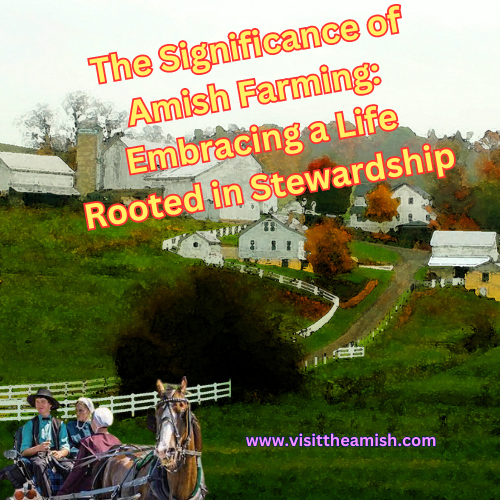The Significance of Amish Farming: Embracing a Life Rooted in Stewardship
In today’s modern world, where traditional occupations are dwindling, the Amish community holds farming in high regard as the epitome of a fulfilling family occupation. Through the practice of agriculture, Amish families can forge stronger bonds by working together at home, nurturing a deep connection with God’s creation and embracing their responsibility as stewards of the Earth.
The Varied Perspectives on Farming Among the Amish
Diverse Career Choices within the Amish Community
While Amish culture cherishes farming, it is essential to note that not all Amish passionately identify with this occupation. Fortunately, the Amish community offers a variety of career choices beyond farming. Many Amish individuals engage in a range of businesses or seek employment with non-Amish employers in factories and various other professions.
Factors Influencing the Decline in Amish Farms
In recent decades, although the overall number of farmers has possibly increased, the percentage of Amish individuals involved in agriculture has declined. The reasons behind this shift are multifaceted. Escalating land prices and the scarcity of farmland have made it increasingly challenging to provide farms for all sons, a long-standing Amish tradition. Moreover, the appeal and growth of alternative Amish businesses, such as construction, woodworking, and manufacturing, have contributed to this decline.
The Cherished Value of the Family Farm
Exploring Alternative Farming Practices
To adapt to changing circumstances, some Amish individuals have embraced lower-acreage, high-intensity produce farming as an alternative to traditional dairy farming. Additionally, raising diverse animals such as poultry, deer, and hogs has emerged as a viable option for Amish farmers. Regardless of their primary occupation, gardening continues to serve as a fundamental practice for almost all Amish families.
Challenging the Perception of Organic Farming
Contrary to popular belief, not all food produced by the Amish adheres to organic standards. While organic farming has gained traction in certain Amish communities in recent years, traditional Amish farming methods involved the use of conventional fertilizers and pesticides, mirroring the practices passed down through generations.

Unpacking the Relationship with Pesticides and Environmental Consciousness
Pesticide Utilization in Amish Agriculture
Most Amish farms operate using conventional farming practices, which include the responsible use of pesticides and fertilizers. While this may differ from contemporary “green” movements, it is important to acknowledge that Amish farming practices strike a balance between sustainable agricultural principles and their immediate farming needs.
Limited Organic Farming Adoption
Although some Amish farmers have chosen to embrace organic farming methods, financial considerations play a significant role in determining the viability of this approach. Consequently, the majority of Amish farms lean towards conventional practices rather than exclusive organic production.
The Complex Relationship with Tobacco Farming
Exploring the Tradition of Tobacco Cultivation
While not all Amish farmers engage in tobacco farming, certain settlements, such as Lancaster County, have a historical association with this cash crop. The profitability of tobacco farming assists in financing expensive farmland, and the process of stripping and sorting tobacco leaves contributes to valuable family activities during the fall season. However, it is important to highlight that not all members of the Amish community support or participate in tobacco farming.

Conclusion:
Amish farming represents more than a mere occupation. Rooted in their deep connection with the land, the Amish view stewardship of the Earth as an essential part of their lifestyle. Although farming is not the sole career path within the Amish community, it remains a cherished vocation that allows families to work together, nurture their relationship with God’s creation, and maintain their cultural identity. As the Amish community continues to evolve, the delicate balance between tradition and adaptation ensures a vibrant future for Amish farming and the sustainable growth of their way of life.


